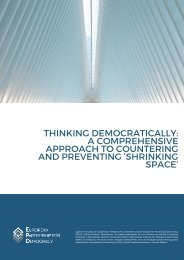Repression and resilience: Diagnosing closing space mid-pandemic
You also want an ePaper? Increase the reach of your titles
YUMPU automatically turns print PDFs into web optimized ePapers that Google loves.
REPRESSION AND RESILIENCE: DIAGNOSING CLOSING SPACE MID-PANDEMIC<br />
35<br />
3. Adapt funding modalities <strong>and</strong> practices to ensure funding empowers change-makers<br />
There are a number of opportunities to make EU funding more effective <strong>and</strong> increase the EU’s leverage in defending<br />
democratic <strong>space</strong>, which are thus far underexploited. Core funding that enables civil society to make the most of online<br />
opportunities <strong>and</strong> improve their connectivity made a major difference in civil society’s ability to defend citizens’ rights<br />
<strong>and</strong> meet their needs in the face of the COVID crisis. At the same time, the EU can enhance its leverage for advancing<br />
democratic <strong>space</strong> using existing tools such as budget support contracts, blended finance investments <strong>and</strong> bilateral<br />
agreements more effectively.<br />
IDEAS FOR ACTION<br />
• Provide core support to civil society to boost their sustainability <strong>and</strong> <strong>resilience</strong> to adapt to changing<br />
needs <strong>and</strong> unforeseen opportunities <strong>and</strong> crises. The roll-out of Framework Partnership Agreements<br />
for human rights <strong>and</strong> democracy funding provides an important opportunity for empowering both<br />
framework partners <strong>and</strong> their local partners in the long term.<br />
• Increase flexible support to unregistered actors, for instance through transparent sub-granting<br />
mechanisms that enable civil society coalitions to channel funding to grassroots change-makers or<br />
through the European Endowment for Democracy in the European neighbourhood.<br />
• Embed democratic principles into blended finance <strong>and</strong> budget support contracts. This includes<br />
conditionality clauses based on independent metrics for monitoring democratic <strong>space</strong>. It also means<br />
including participatory decision-making mechanisms in all stages of the project - from the inception to<br />
implementation - with a special focus on engaging women, minorities <strong>and</strong> vulnerable populations.<br />
• Incentivise innovation in EU Delegations <strong>and</strong> European embassies, in order to find new ways to counter<br />
attacks <strong>and</strong> exp<strong>and</strong> democratic <strong>space</strong>, for instance through a special envelope for innovative pilot<br />
projects that encourages risk-taking.<br />
4. Support structural reform through local civil society<br />
Civil society <strong>and</strong> community organisers have been instrumental in responding to societal needs <strong>and</strong> mobilising solidarity<br />
networks in the face of the p<strong>and</strong>emic, <strong>and</strong> will be equally essential to identify the necessary structural reforms <strong>and</strong><br />
short-term strategies for an inclusive post-p<strong>and</strong>emic recovery. Yet these same actors have also suffered from a major<br />
increase in violent attacks globally, <strong>and</strong> have seen advocacy-focused funding dwindle despite the acute needs for<br />
oversight during the p<strong>and</strong>emic. As a scenario of building back better becomes increasingly unlikely, civil society actors<br />
will need all the support they can get for defending <strong>and</strong> exp<strong>and</strong>ing democratic <strong>space</strong>.

















